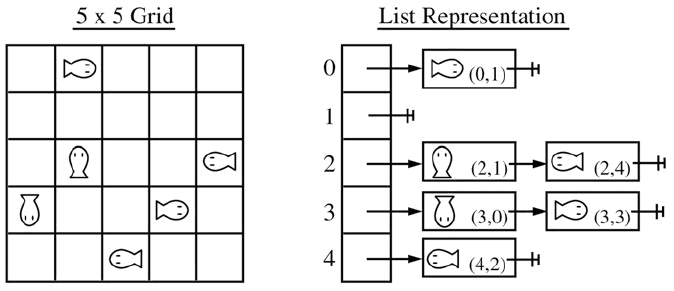| |
SMBoundedEnv
Background:
In the original version of the case study, the BoundedEnv
class uses a two-dimensional array of Locatable objects, theGrid,
to represent the region in which the simulation takes place.
However, it raises the issue of a very large grid of fish that might not
fit into memory. A related concern is that even for a moderate sized grid
that does not strain memory limits, the size of the grid may be much
larger than the number of fish in the model, thereby wasting space and,
perhaps, time.
Consider an alternate representation where the fish in each row are
stored in a singly linked list. The implementation of theGrid
becomes a one-dimensional array where each entry is a reference to the
first node in the linked list for that row, or null if the row is empty.
Each list node contains a fish and a reference to the node containing the
next fish in that row. The linked list is ordered by column index of the
location of the fish, from smallest to largest.
In the example below, a 5 x 5 grid is diagrammed on the left and the
list representation of that grid is shown on the right. In this
representation, theGrid[2] is a reference to the first node
of a list containing two fish: a fish facing north at location (2,1) and a
fish facing west at location (2,4). The element theGrid[1] is
null, indicating that there are no fish in that row.

A two-dimensional array in which most of the elements are
"empty" is a sparse array. There are different data
structures for representing a sparse two-dimensional array. We
investigate a structure that uses an array of rows, where each row is a
linked list of Locatable objects.
Assignment:
-
Implement a class to represent a very large bounded environment
that contains relatively few fish. Define an SMBoundedEnv
class that uses a sparse matrix.
-
This version should extend SquareEnvironment and
should use an array of linked lists to represent the grid of Locatable
objects.).
-
Each element in the array should be a linked list of the objects
that occur in that row of the grid, in increasing column order.
-
The linked list should be of type java.util.LinkedList.
-
All LinkedList traversals should be done using Iterator
objects.
-
If you are using the graphical user interface, edit the MBSGUI
class and add SMBoundedEnv to the list of classes that
can represent bounded environments. Now when you read in a file
specifying a bounded environment, you will be given a choice as to
which representation you would like to use.
Instructions:
-
Modify and write code as necessary to satisfy the above
specifications.
-
Test the SMBoundedEnv class using appropriate test
configurations to ensure that all conditions function correctly.
-
Submit the source for the SMBoundedEnv class only.
|


